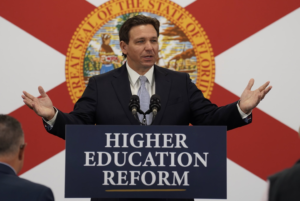
Florida Governor Ron DeSantis is looking to mandate a “core curriculum” in the state’s public universities for the purpose of ensuring that college graduates are grounded in Western civilization.
The goal of the governor’s core curriculum is to have students graduate with an overall understanding of “human knowledge.”
However, most universities in Florida don’t require students to take specific core courses. Instead, they allow students to pick whatever arts courses, stem courses, etc., they desire.
Argene Lynn, a second-year student at Florida A&M University, said that he’s not opposed to a core curriculum but wants the opportunity to choose his own classes.
“I’m OK with a certain amount of my classes being chosen for me as long as I still get the chance to take the classes that spark my interest,” Lynn said.
Larry Rivers, former Fort Valley State University president and a current distinguished history professor at FAMU, says that students should take classes outside of their major but that they should be classes they are interested in, too.
“I strongly believe that students should take classes that spark their interest as well as courses prescribed by their academic advisers,” Rivers said. “I think students should be strongly encouraged to take courses in the social sciences, humanities, arts and sciences…courses from these disciplines will help to make students well-rounded academically.”
However, higher education instructors struggle with the idea of what a core curriculum should include.
Roosevelt Montás, senior lecturer in American studies and English at Columbia University, created the core curriculum at Columbia from 2008 to 2018.
“It would be incredibly difficult to craft a core curriculum today, and I don’t know anybody who’s trying to do it,” Montás said in an interview with TheHill.com.
What would education look like if students were forced to take certain classes? How diverse would this curriculum be?
In previous years, specifically in the civil rights era, professors and students weren’t fond of the core curriculum because it ignored important topics such as Black history and women. This raises concerns for some as a possible issue with the diversity of a core curriculum today.
Rivers says that if there were to be a core curriculum implemented that it should reflect Florida and its diversity.
“There is a move in Florida to de-emphasize the significant contributions of people of color. Florida has a very diverse population, and the overall social science curriculum should reflect the contributions of all racial and ethnic groups that comprise Florida,” Rivers said.